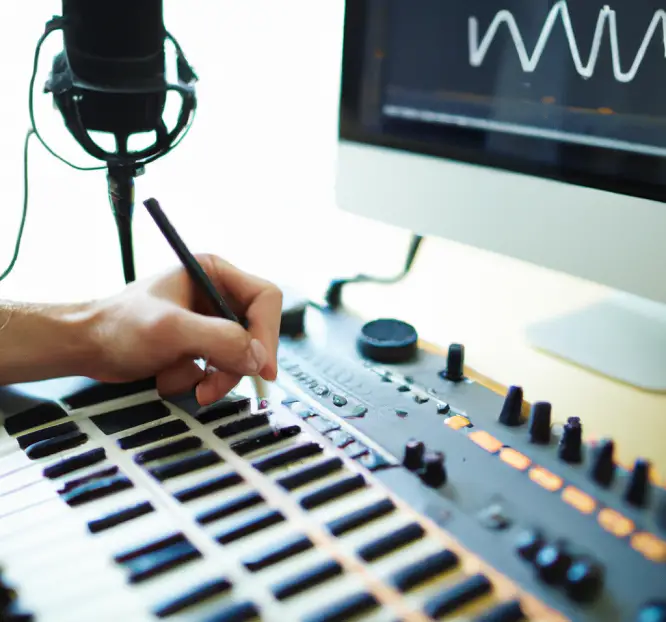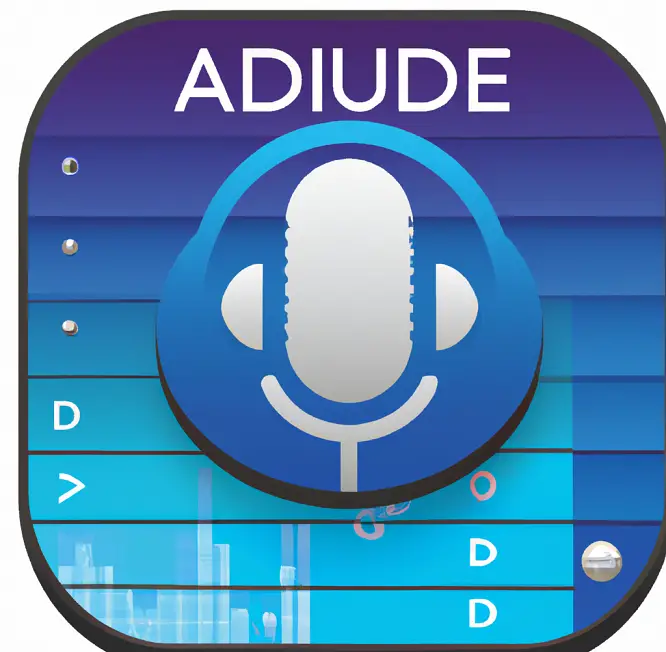As an teenage audio editor, your primary responsibility is to receive various types of audio files and transform them into polished and finalized products that fulfill the needs of clients. These files could range from podcast interviews, lectures, conversations, music, or any other form of audio that requires refinement.
When you receive an audio file, your first task will be to assess its quality and determine which areas require improvement. This may involve cutting out any unwanted noise, such as static, background sounds or clicks, and ensuring that the sound levels are balanced throughout.
Your role may also involve implementing various sound effects, such as EQ adjustments or compression, to enhance the overall quality of the audio. Additionally, you may be tasked with adjusting the timing or tempo of the audio to align it with the desired outcome.

Why You should choose Audio Editor on Teenage?
- Creative outlet: Teenagers often have a lot of energy and creativity that they need to channel into something productive. An audio editor can provide an avenue for this creativity by allowing them to experiment with different sounds and create their own music or sound effects.
- Career aspirations: If a teenager is interested in pursuing a career in music or sound engineering, learning an audio editor can be a valuable skill to have. They can start building their portfolio and gaining experience early on, which can give them a competitive advantage later on.
- Personal projects: Many teenagers have personal projects that they want to work on, such as recording their own podcast or creating their own music. An audio editor can help them achieve these goals and make their projects sound more professional.
- Collaborations: With the rise of online collaboration, it’s becoming easier for teenagers to work with other musicians and content creators from all over the world. Knowing how to use an audio editor can make it easier to collaborate on music and sound projects.
- Fun and enjoyment: Finally, it’s worth noting that learning an audio editor can simply be a fun and enjoyable hobby for teenagers. It’s a creative and rewarding skill that they can develop at their own pace, and it can provide a sense of accomplishment and satisfaction when they create something they’re proud of.
What Steps I Can Get Started as a Teenage Audio Editor?
- Before you begin your journey to becoming a teen audio editor, it is crucial to have a conversation with your parent(s) and let them know about your plans. It’s important to keep them informed and seek their help and guidance.
- Fortunately, starting as an audio engineer can be relatively easy, and with the abundance of jobs available, you can find work quickly. To begin, it’s recommended that you acquire the necessary training and skills by using audio editing software. While there are many paid options available, Audacity is a free software that is widely used in the audio industry and can be a great place to start.
- Once you have the software, the next step is to learn how to use it. While YouTube tutorials can be helpful, they may not cover everything you need to know, and it can be time-consuming to find the right information. Therefore, we suggest taking advantage of a course available on Lynda.com, with your parent’s permission, which offers a free trial period.
- We recommend enrolling in the course “Learning Audacity by Garrick Chow” to gain a comprehensive introduction to the software. The course can equip you with the knowledge and skills required to begin editing audio right away. With dedication and practice, you can hone your skills and become proficient in audio editing, paving the way for a successful career in the audio industry.
-
To improve your audio editing skills, it’s recommended that you practice by asking family members, friends, teachers, and anyone else if they need any audio editing done. This will allow you to gain some valuable experience before you start working for others. It’s important to invest a few weeks in practicing and refining your skills, so that you can deliver quality work to your clients.
-
Once you feel confident in your skills, it’s time to start looking for work. A great platform to start with is Upwork.com, which is free to join and has a variety of audio editing jobs available. Since audio editing is a common task, there are many opportunities to find work on the platform. It’s best to start with a low hourly rate, such as $5.00 per hour, and gradually increase your rate as you gain experience and successfully complete projects. Within a month or two, you can potentially be earning a minimum of $10 per hour.
-
Congratulations! You are now a teenage audio editor, ready to start working on various projects such as interviews and podcasts. As you gain more experience, you can expand into other areas such as music editing. If you decide to pursue this career path and truly enjoy editing audio files, you can eventually become an audio engineer. According to Salary.com, a full-time audio engineer can make around $50,000 per year. So, with hard work and dedication, you can turn your passion for audio editing into a lucrative career.
Teenage Audio Editor salary
Becoming an audio editor can be a lucrative career path for those with a passion for music and sound engineering. With the right skills and expertise, it’s possible to earn a competitive hourly wage of $20 to $30, or even more, for editing and refining audio recordings.
However, like any profession, it’s important to start at a realistic level and work your way up. As a new audio editor, it’s recommended that you begin by charging around $10 per hour for your services. This is a fair wage for someone just starting out, and it will give you the opportunity to gain valuable experience, build your portfolio, and establish yourself in the industry.
Duty Of a Teenage Audio Editor
As a teenage audio editor, your primary duty is to ensure that the audio content you are working on meets the required standards of quality. This involves editing, mixing, and mastering audio recordings to achieve the desired sound quality and clarity.
Additionally, you have a responsibility to understand and comply with copyright laws and licensing requirements when working with audio material. This means that you must ensure that you have the necessary permissions and licenses to use any copyrighted material in your work, and that you do not infringe on the rights of others.
As an audio editor, it is also important to stay up-to-date with the latest technologies and techniques in the field. This means keeping abreast of new software, plugins, and other tools that can help you achieve the best possible results in your work.
Finally, you should always strive to communicate clearly and effectively with clients and colleagues, and be open to feedback and constructive criticism. By doing so, you can ensure that your work meets the needs and expectations of those you are working with, and that you continue to improve and grow as an audio editor.
Pros and Cons of Teenage Audio Editor
Pros:
-
Creative outlet: Teenage audio editors can express their creativity through sound and music, which can be a great form of self-expression and help them develop their artistic abilities.
-
Skill development: Audio editing requires technical skills, such as using software and equipment, and these skills can be developed over time through practice and experimentation.
-
Career opportunities: If a teenager is passionate about audio editing, it could potentially lead to career opportunities in the music industry, film industry, or even in video game development.
-
Collaboration: Audio editing can also be a collaborative process, allowing teenagers to work with others and learn how to communicate and work effectively in a team.
Cons:
-
Cost: Audio editing software and equipment can be expensive, and it may not be feasible for a teenager to purchase or have access to high-quality tools.
-
Time-consuming: Audio editing can be a time-consuming process, and teenagers may find it difficult to balance their editing hobby with schoolwork and other responsibilities.
-
Technical challenges: Audio editing can be a technically challenging activity, and teenagers may need to invest time and effort to learn how to use the software and equipment effectively.
-
Hearing damage: If teenagers are using headphones or speakers to edit audio, they should be aware of the risk of hearing damage and take steps to protect their ears.
How to Become a Teenage Log Splitter 2023
Frequently Asked Questions
What is an audio editor, and what do they do?
An audio editor is responsible for recording, editing, and mastering audio recordings. This can include music, sound effects, and voice-overs for podcasts, radio shows, or movies.
What qualifications do I need to become a teenage audio editor?
You don’t necessarily need any formal qualifications to become a teenage audio editor. However, it is recommended that you have a good understanding of audio software, music theory, and audio production techniques.
What equipment do I need to become a teenage audio editor?
You will need a computer or laptop with audio editing software installed, a good quality microphone, and headphones.
What software do I need to become a teenage audio editor?
There are many different audio editing software options available, such as Adobe Audition, Audacity, and Pro Tools. It’s recommended that you research and try out different options to see which one you prefer.
What skills do I need to become a teenage audio editor?
Some of the skills you will need as a teenage audio editor include attention to detail, good communication skills, an understanding of music theory, and a willingness to learn new techniques.
How can I improve my audio editing skills?
You can improve your audio editing skills by practicing regularly, taking online courses, attending workshops or seminars, and seeking feedback from other audio editors..
Final Summary
As a teenage audio editor, your duty is to ensure that the audio content you work on meets the required standards of quality, while also complying with copyright laws and licensing requirements. You should stay up-to-date with the latest technologies and techniques in the field and communicate clearly and effectively with clients and colleagues while being open to feedback and constructive criticism. By doing so, you can continue to improve and grow as an audio editor.
